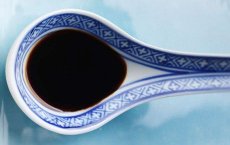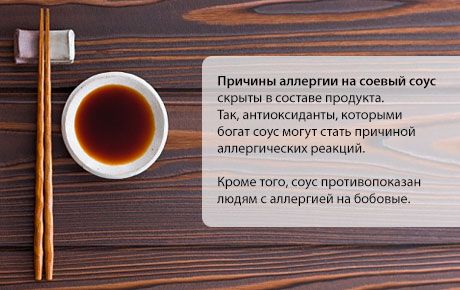Medical expert of the article
New publications
Soy sauce allergy
Last reviewed: 05.07.2025

All iLive content is medically reviewed or fact checked to ensure as much factual accuracy as possible.
We have strict sourcing guidelines and only link to reputable media sites, academic research institutions and, whenever possible, medically peer reviewed studies. Note that the numbers in parentheses ([1], [2], etc.) are clickable links to these studies.
If you feel that any of our content is inaccurate, out-of-date, or otherwise questionable, please select it and press Ctrl + Enter.

Allergy to soy sauce is classified as a food allergy. Let's look at the characteristics of soy sauce allergy and how to treat this disease.
Allergy to soy sauce occurs due to the irritating effect of soy on the body. Soy sauce is obtained from the fermentation products of soybeans under the influence of fungal microorganisms. Soy sauce is a dark-colored liquid with a sharp odor. In Japan, soy sauce is used in cooking in almost all dishes, it gives food a piquancy and a special aroma. But even among the Japanese, there are people who suffer from an allergy to sauce. Soy sauce is a dietary product that is recommended by many nutritionists. It replaces mayonnaise, seasonings, salt and does not contain cholesterol. The calorie content of the product is 55 calories per 100 grams of sauce. It is great for people on a diet, as it contains a minimum of sodium.

Despite all the beneficial properties of soy sauce, it is an allergenic product, as it very often causes symptoms of food allergies. Soy sauce affects the endocrine system. Children who consume the sauce expose their thyroid gland to dangerous diseases, and in adults, diseases may worsen. The sauce contains isoflavones, which are similar in composition to female sex hormones. They have a negative effect on pregnant women, as they affect the development of the brain in the embryo. In addition, soy sauce increases the risk of premature birth and miscarriage. Therefore, pregnant women and children are prohibited from consuming soy sauce.
Causes of Soy Sauce Allergy
The causes of allergies to soy sauce are hidden in the composition of the product. Thus, antioxidants, which the sauce is rich in, can cause allergic reactions. In addition, the sauce is contraindicated for people with allergies to legumes. Many leading allergists associate allergies to soy sauce with improper preparation of this product. Let's look at the main causes of allergies to soy sauce.
The presence of artificial additives – synthetic substances cause allergic reactions. Thus, manufacturers save on production, but do not care about the health of their consumers.
- In the process of producing soy sauce, hydrochloric and sulfuric acid and alkali are very often used. This speeds up the fermentation process of the sauce, but is dangerous to human health.
- Cheap soy sauce may contain GMOs, which cause allergic reactions. That is why when buying sauce, special attention should be paid to the composition of the product.
- Soy sauce is contraindicated for people with kidney and cardiovascular diseases. Also, the sauce is not recommended for children under three years of age and pregnant women.
Symptoms of Soy Sauce Allergy
Symptoms of soy sauce allergy may appear immediately after consuming the product or after some time. It depends on the immune system and predisposition to allergic diseases. Symptoms of soy sauce allergy:
- Skin rashes, itching, eczema, redness and swelling.
- Stuffy nose, asthma attacks, asphyxia due to swelling of the throat.
- Problems with the gastrointestinal tract, diarrhea, colic, flatulence.
- Low blood pressure, general weakness, nausea, conjunctivitis.
These are common symptoms of soy sauce allergy, but each person experiences them differently. So if you notice a rash on your skin or feel unwell after consuming soy sauce, stop consuming the sauce and contact an allergy center.
Diagnosis of Soy Sauce Allergy
Diagnosis of allergy to soy sauce is based on anamnesis, visual and laboratory examinations. Thus, when diagnosing allergies based on the symptom of a problem with the gastrointestinal tract, allergy to soy sauce is confused with other food allergies and diseases with similar symptoms. That is why visual examination is used to clarify the diagnosis. An allergist examines the affected areas of the skin and gives recommendations for restoring the body.
In addition to visual and symptomatic diagnostics, laboratory tests and allergen tests are used. To conduct laboratory diagnostics, the patient's blood is taken for analysis and a skin scraping. During the allergen test, extracts of suspected allergens are injected into the patient's skin and the reaction is determined. As a rule, soy sauce is consumed with sushi (a traditional Japanese dish). And sushi contains dried seaweed and raw fish, which can also cause an allergy. If the allergy symptoms are pronounced and life-threatening, the patient is transferred to an inpatient treatment at an allergy center.
Treatment for Soy Sauce Allergy
Treatment of soy sauce allergy begins with diagnosis of the disease. If the allergy is confirmed, then step-by-step therapy is carried out, aimed at restoring health and eliminating signs of allergy. Of particular importance in the treatment process is a balanced diet and adherence to a diet that does not contain allergenic products. It is necessary to completely exclude legumes and soy products from the diet, as they can provoke allergic attacks.
When treating an allergy to soy sauce, both traditional and non-specific treatment methods can be used, which are aimed at eliminating the symptoms of the disease. In addition, the patient may be prescribed drug therapy, that is, treatment with drugs and restorative injections.
Medicines for soy sauce allergy:
- H1-antihistamines (cetirizine, ebastine, desloratadine) are used to treat food allergies, including soy sauce allergies. Doses of the drug are prescribed by an allergist and are adjusted depending on the patient's age and allergy symptoms. The main contraindications to taking the tablets are pregnancy and individual intolerance to the components of the drug.
- H1 blockers – used to treat allergies that have caused skin lesions (itching, hives, swelling). The drugs are contraindicated for people with liver and kidney disease, as well as pregnant women and children under three years of age. The dosage of the drug is determined by the doctor.
- Chloropyramine – effectively relieves allergy symptoms and is used in combination with antihistamines. The drug is contraindicated during lactation and pregnancy, as well as in respiratory diseases.
- Immunotherapy and antibody injections (anti-E immunoglobulin) – reduce allergy symptoms and are used to restore a damaged immune system.
Considering that with food allergies, the symptoms of an allergic disease arise from different organs and tissues (eyes, ears, throat, respiratory tract, gastrointestinal tract, skin), preference in most cases must be given to systemic drugs (taken orally).
Preventing Soy Sauce Allergy
Prevention of allergy to soy sauce involves a complete rejection of it and products that contain soy and legumes. It would not be superfluous to conduct diagnostics of the body to determine what type of legumes the allergic reaction occurs to. Preventive measures also involve the rejection of other allergen products that can cause symptoms similar to allergy to soy. A consultation with a nutritionist is mandatory to create a balanced menu and exclude the use of soy sauce and soy.
Allergy to soy sauce requires the only correct method of treatment – complete refusal of soy sauce and soy products. This will allow you to avoid a number of painful symptoms and problems with the body.


 [
[